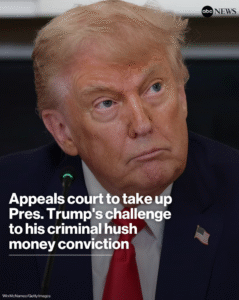
Trump’s Attorney Asks Judges to Move Appeal of NY Hush Money Conviction to Federal Court
In a bold legal maneuver, attorneys for former President Donald J. Trump have formally requested that the appeal of his recent New York criminal conviction be transferred from state court to federal jurisdiction. The request, filed Tuesday, comes just weeks after Trump was found guilty on 34 felony counts of falsifying business records related to a 2016 hush money payment made to adult film actress Stormy Daniels.
Trump’s legal team argues that the case, while prosecuted under New York law, directly involves actions taken while Trump was president and, therefore, should fall under federal oversight. The move is widely seen as an effort to shift the appeal to what Trump’s lawyers believe may be a more favorable legal and political landscape—especially as the former president mounts his 2024 campaign amid mounting legal challenges.
“The prosecution of a sitting or former president over actions closely tied to federal office raises serious constitutional concerns,” said Trump attorney Todd Blanche in a statement. “We believe the federal courts are the proper forum for reviewing such matters, where broader questions of executive privilege and separation of powers can be fully addressed.”
Legal experts, however, are divided on whether the effort will succeed. Generally, criminal matters handled by state courts—even those involving national figures—remain within state jurisdiction unless specific federal laws or duties are implicated. In Trump’s case, the Manhattan District Attorney’s office successfully prosecuted him for allegedly disguising reimbursement payments to his former lawyer, Michael Cohen, as legal expenses. Cohen had paid $130,000 to Daniels in the weeks leading up to the 2016 election to keep her from speaking publicly about an alleged affair with Trump, which he denies.
The strategy to appeal in federal court isn’t unprecedented, but it is rare—and the bar for removal is high. To justify a federal appeal, Trump’s attorneys would need to prove that the acts for which he was convicted were carried out “under color of office,” a legal term indicating actions done as part of official federal duties.
So far, New York prosecutors maintain that the case was grounded in state law and involved private conduct that occurred before Trump took office.
“The jury heard the evidence. They found him guilty on all counts. Now he’s trying to run from accountability by shopping for a different court,” said a spokesperson for the Manhattan District Attorney’s office.
The appeal comes as Trump’s sentencing looms on July 11—just four days before the Republican National Convention in Milwaukee. He faces a possible sentence ranging from probation to four years in prison, though many legal observers expect a sentence of probation or home confinement, given the non-violent nature of the charges and his status as a first-time offender.
As Trump continues to campaign under the shadow of multiple indictments, this latest legal twist highlights the unprecedented intersection of politics, the judiciary, and the 2024 presidential race. Whether the federal courts take up the appeal could set a significant precedent not only for Trump—but for future presidents facing legal scrutiny after leaving office.
